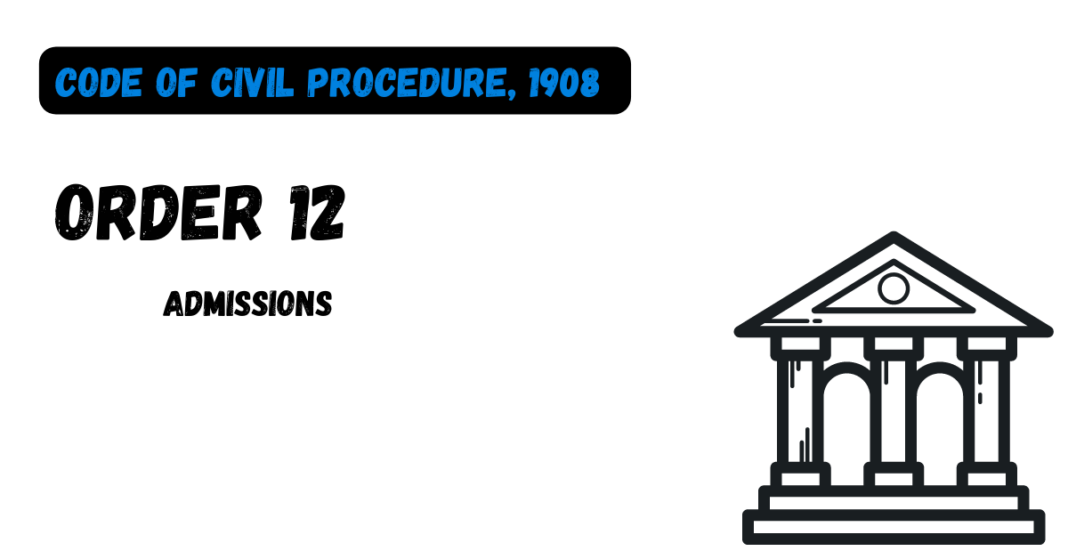1. Notice of admission of case.—Any party to a suit may give notice, by his pleading, or otherwise in writing, that he admits the truth of the whole or any part of the case of any other party.
2. Notice to admit documents.—Either party may call upon the other party to admit, within seven days from the date of service of the notice any document, saving all exceptions; and in case of refusal or neglect to admit, after such notice, the costs of proving any such document shall be paid by the party so neglecting or refusing, whatever the result of the suit may be, unless the Court otherwise directs; and no costs of proving any document shall be allowed unless such notice is given, except where the omission to give the notice is, in the opinion of the Court, a saving of expense.
2A. Document to be deemed to be admitted if not denied after service of notice to admit documents.—(1) Every document which a party is called upon to admit, if not denied specifically or by necessary implication, or stated to be not admitted in the pleading of that party or in his reply to the notice to admit documents, shall be deemed to be admitted except as against a person under a disability:
Provided that the Court may, in its discretion and for reasons to be recorded, require any document so admitted to be proved otherwise than by such admission.
(2) Where a party unreasonably neglects or refuses to admit a document after the service on him of the notice to admit documents, the Court may direct him to pay costs to the other party by way of compensation.
3. Form of notice.—A notice to admit documents shall be in Form No. 9 in Appendix C, with such variations as circumstances may require.
3A. Power of Court to record admission.—Not with standing that no notice to admit documents has been given under rule 2, the Court may, at any stage of the proceeding before it, of its own motion, call upon any party to admit any document and shall, in such a case, record whether the party admits or refuses or neglects to admit such document.
4. Notice to admit acts.—Any party may, by notice in writing, at any time not later than nine days before the day fixed for the hearing, call on any other party to admit, for the purposes of the suit only, any specific fact or facts, mentioned in such notice. And in case of refusal or neglect to admit the same within six days after service of such notice, or within such further time as may be allowed by the Court, the costs of proving such fact or facts shall be paid by the party so neglecting or refusing, whatever the result of the suit may be, unless the Court otherwise directs: Provided that any admission made in pursuance of such notice is to be deemed to be made only for the purposes of the particular suit, and not as an admission to be used against the party on any other occasion or in favour of any person other than the party giving the notice:
****
5. Form of admissions.—A notice to admit facts shall be in Form No. 10 in Appendix C, and admissions of facts shall be in Form No. 11 in Appendix C, with such variations as circumstances may require.
6. Judgment on admissions.—(1) Where admissions of fact have been made either in the pleading or otherwise, whether orally or in writing, the Court may at any stage of the suit, either on the application of any party or of its own motion and without waiting for the determination of any other question-between the parties, make such order or give such judgment as it may think fit, having regard to such admissions.
(2) Whenever a judgment is pronounced under sub-rule (1) a decree shall be drawn up in accordance with the judgment and the decree shall bear the date on which the judgment was pronounced.
7. Affidavit of signature.—An affidavit of the pleader or his clerk, of the due signature of any admissions made in pursuance of any notice to admit documents or facts, shall be sufficient evidenced of such admissions, if evidence thereof is required.
8. Notice to produce documents.—Notice to produce documents shall be in Form No. 12 in Appendix C, with such variations as circumstances may require. An affidavit of the pleader, or his clerk, of the service of any notice to produce, and of the time when it was served, with a copy of the notice to produce, shall in all cases be sufficient evidence of the service of the notice, and of the time when it was served.
9. Costs.—If a notice to admit or produce specifies documents which are not necessary, the costs occasioned thereby shall be borne by the party giving such notice.





